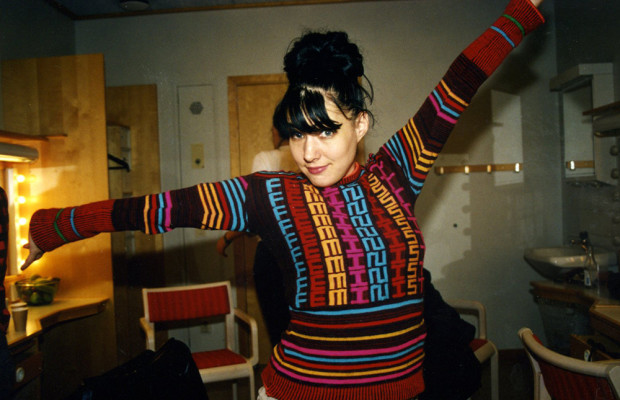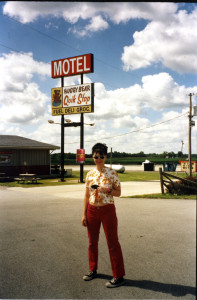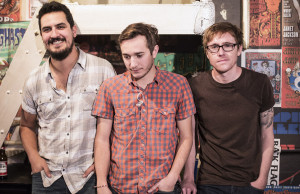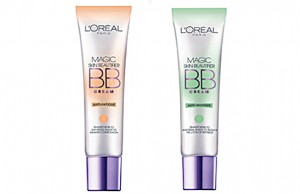
Young girls of the current generation may not know who she is, but Kathleen Hanna literally started a movement. As the former front woman for feminist punk bands Bikini Kill and Le Tigre, Hanna sang about misogyny, domestic violence and finding your own voice. She helped create the Riot Grrrl movement and was an integral part of third wave feminism. Young women in the 90s saw Hanna as a heroine, but in 2003 she mysteriously left the spotlight and stopped performing.
Nearly a decade passed before we would hear from Hanna again, but this past November a documentary called “The Punk Singer” emerged onto the scene and brought Hanna back to the stage. The film, directed by Sini Anderson, follows Hanna from her beginnings in Olympia, Washington all the way through her decision to leave Le Tigre (she stopped performing because of her struggle with late-stage Lyme disease) and now her new project, The Julie Ruin.
Hollywood Times Square caught up with Hanna to chat about her diagnosis, getting back into performing, and where the feminist movement is today.
The film alludes to the fact that your illness is something of a mystery to people. Was this something that you were purposely keeping to yourself? If so, why was that?
Well I didn’t tell my wider circle of friends for a really long time. I think my core group of friends and my family new something was wrong, but they didn’t know what it was. I also didn’t know what it was so it was really hard to tell people besides my family. My current band mates in The Julie Ruin, we were writing the record and I still didn’t have a diagnosis. I was constantly going to specialists and coming in with a different diagnosis every week. Saying, hey you know someone told me I have Chron’s disease, oh someone told me I have degenerative arthritis or whatever. It wasn’t a conscious decision not to tell anybody. It’s not like, I’m not like Miley Cyrus and everybody’s not banging down my door to found out every last thing that’s going on with me, you know what I mean? I told my friends at my birthday when I had a birthday cake shaped like a tick and when I cut into it like fake blood squirted everywhere. And that’s how my friends found out, they asked why I had that cake. I told everybody I had Lyme disease and it was a really bad idea because then I spent my birthday talking about Lyme disease. Happy birthday to me!

Photo courtesy of IFC Films
I read an article recently that quoted Miley Cyrus as saying I’m one of the biggest feminists and I was wondering if you could just comment on that?
I just… you know when the word feminist gets brought up by somebody who everyone is watching, it means that people are going on the interest and they’retyping ‘what does feminism mean?’ And that makes me happy because I think about you know, if I was nine years old and I was a Miley Cyrus fan – I am actually a Miley Cyrus fan, of two songs, I really like Party in the USA and I like The Climb — um and my friend actually did a whole show based on Miley Cyrus. She’s a performance artist so she should really be the one being asked this question, but you know I just imagine being nine years old and loving the songs or loving Hannah Montana and being like ‘whoa what’s feminism?’ And then ending up reading something about domestic violence and being like ‘that happens in other people’s houses because that’s happening in my house. I can get help for that?’ There’s got to be at least one person that that happens for because she’s using that word so whether I like her other art or not, or whether I agree with every artistic decision she makes is beyond the point. I think the fact that she said that word and has such a large platform is only going to do good. I can’t say if she’s a feminist or not because that’s up to her.
I know that you and Sini are friends, why did you decide to have her tell this story about you now?
Ummm… three things… bullet points. One, I knew Sini for 15 years and we were part of the same scene. Two, I was really sick and didn’t think I’d ever be able to have a movie made about me again and there wasn’t a lot of video footage of me talking that existed in the world and three, one of the reasons that I didn’t want to do it [before] was that I realized I internalized sexism. That I felt like it was stepping forward and taking credit for my accomplishments and somehow I thought that was bad and I wanted to get over that hurtle, so I said yes.
In the documentary you mentioned that there was a point in your life when you were really media averse and now you’re doing interviews. What changed in you in terms of that and being able to talk to the media?
I think all of us would say we don’t trust the media to a certain extent depending on what media is, like if it’s Fox News of course I don’t trust it, but I realized things are more permeable and you know writers need to make money and a lot of them are really fucking cool. I have friends who are journalists now, so I’m kind of like ‘look it’s not this universal thing where they’re all assholes.’ And when I was really young and I didn’t know what a publicist was or a manager or any of that stuff, it was just too much for us to handle and too much for us to manage. And because we didn’t step forward with our own footage or own story or whatever, you know we were writing our own stories in our fanzines and that was enough for us. We didn’t need to be in glossy magazines. That wasn’t really the goal, the goal was to change things on the underground for the better, the underground music scene, we weren’t really that interested in the main stream. I feel like in Le Tigre I was more interested in the mainstream and also we had help and so it was so much easier to deal with the media when there was a buffer and when it’s not just too much work you know what I mean? Part of it was just that it was too much work for four totally dysfunctional fuck ups to be perfectly honest. In the movie it was like ‘oh that was just our decision’ and yeah there’s a part of like mythology around it, cause that’s what it is, but you know truth be told we were a bunch of fuck ups that didn’t know what we were doing. And now that I look back on it the fact that we got in any magazines at all is totally weird and incredible and that’s what brought a lot of people into the feminist punk rock scene, is like an article in Spin that they read. So at the time maybe I hated it but it’s like I hated Girl Power when Spice Girls stole it but then I’d rather have six year olds dancing around to that than Blurred Lines or something.
Have you seen any kind of change in the way that you’re talked about ever since you put your own voice out there?
Hmmm… that’s interesting. I don’t know I mean I try really hard not to read the press. I read stuff when it’s in the New York Times because I know my mom’s going to see it, but I try not to read too much, but maybe go to the next question because I really don’t know how I’m perceived at all. I have no idea. Is that really bad?
No not at all. If I were you I would think it’s better not to know what people are saying about me. I think you have the right idea. Back then you talked a lot about feminism and where feminism was, where do you think it is now because it’s not really something you hear people talk about as much, so how do you think it’s doing now?
I feel like with this recent spat of pop stars who are debating if they’re feminists or not or whatever – Miley Cyrus and Lady Gaga and Taylor Swift – I think that there’s a national conversation about that, there’s a national conversation about Pussy Riot, which is sort of fading from view now, but still there in the distant. And then what’s going on in Texas is mobilizing a lot of women and a lot of people in general, so I think that there’s some exciting stuff happening. From what I see when I do lectures and stuff, or like I just did a q & a for the film the other night and there were five teenagers in the front row who are starting a feminist club at their school and I was just really moved by that. And I get letters all the time from other teenage girls that are like I’m starting a feminist club and I’m just like how awesome is that? It’s really great.
You may also like...
1 Comment
Leave a Reply
Cancel reply
Copyright © 2013 Hot Topix Theme. Theme by MVP Themes, powered by Wordpress.




mike
January 17, 2014 at 7:20 am
Hi, i have reading out and i will definitely bookmarrk your site, just wanted to say i liked this article.